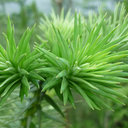Allelopathy in rice (Oryza sativa) is a chemically induced response that is elevated by the exogenous application of chemical compounds and barnyard grass root exudates. An in-depth understanding of the response mechanisms of rice to chemical induction is necessary for the identification of target genes for increasing the allelopathic potential of rice. However, no previous studies have evaluated the transcriptomic changes associated with allelopathy in rice in response to barnyard grass exudates treatment. Thus, the aim of the present study was to reveal differentially expressed genes (DEGs) in allelopathic and non-allelopathic rice seedlings treated with barnyard grass exudates to identify target allelopathy genes.The inhibitory effect of the culture solutions on the allelopathic rice accession PI312777 (PI) and the non-allelopathic rice accession Lemont (LE) significantly increased (P < 0.05) after treatment with barnyard grass root exudates. The RNA sequencing results revealed that 14,891 genes in PI(+B) vs. LE(+B), 12,505 genes in PI(+B) vs. PI(-B), and 5857 genes in LE(+B) vs. LE(-B) were differentially expressed following root exudates treatment. These DEGs were classified into three categories and 32 functional groups, i.e., 12 groups in the biological process category, 12 groups in the cellular component category, and eight groups in the molecular function category. There were 5857 and 2846 upregulated genes and 135 and 50 upregulated Gene Ontology terms (P < 0.05) in the biological process category in PI(+B) vs. PI(-B) and LE(+B) vs. LE(-B), respectively. These results indicated that the allelopathic accession PI is more sensitive than the non-allelopathic accession LE to exogenous root exudates treatment. Genes related to rice allelochemical-related biosynthesis pathways, particularly the shikimic acid and acetic acid pathways, were significantly differentially expressed in both rice accessions. These findings suggested that phenolic acids, fatty acids, and flavonoids, which constitute the downstream metabolites of the shikimic acid and acetic acid pathways, are significantly expressed in response to root exudates of barnyard grass.The allelopathic potential of both rice accessions could be significantly enhanced by barnyard grass root exudates application. Furthermore, genes related to the biosynthesis pathways of reported rice allelochemicals were significantly differentially expressed in both accessions. Phenylalanine ammonia lyase was determined to be a potential target for the regulation of chemical induction.





